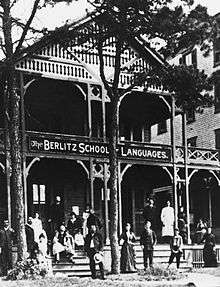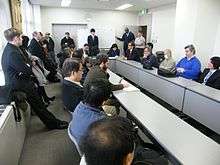Berlitz Corporation
Berlitz Corporation is a Japanese-owned language education and leadership training company which is based in Princeton, New Jersey. The company was founded in 1878 by Maximilian Berlitz in Providence, Rhode Island in the United States. Berlitz Corporation is now a member of the Benesse Group, a Japanese company, with more than 547 company-owned and franchised locations in more than 70 countries.[1]
 | |
| Subsidiary of Benesse Corporation | |
| Industry | Leadership training, language services |
| Founded | Providence, Rhode Island July 1878 |
| Founder | Maximilian Berlitz |
| Headquarters | |
Number of locations | 500+ |
Area served | 70 countries |
Key people | Curtis Uehlein (CEO) |
| Parent | Benesse Corporation |
| Website | berlitz |
History

Berlitz started in 1878, when Maximilian Berlitz was in need of an assistant French instructor; he employed a Frenchman by the name of Nicholas Joly, only soon to discover that Joly barely spoke English, and was hired to teach French to English speakers in their native language. The first Berlitz language school opened in Providence, Rhode Island, in July 1878. A decade later, Berlitz moved to Boston, Massachusetts, and opened additional schools. Soon after, he opened schools in New York and New Jersey. In 1886, he moved the headquarters and his personal residence to New York City. In 1895, a children's language learning book was published by Maximilian Berlitz.[3] By 1914, there were about 200 Berlitz schools; 63 Berlitz schools in Germany, and 27 in Britain.[4]
Growth
By the time of the start of World War I in 1914, there were over 200 Berlitz Schools worldwide. Maximilian Berlitz died in 1921. His son-in-law and associate, Victor Harrison-Berlitz, assumed leadership of the business. Harrison died in 1932, and control passed briefly to his son, Victor Harrison-Berlitz, Jr. The control of the company was thereafter passed to Jacques Strumpen-Darrie. Jacques' son Robert succeeded his father as president in 1953.[5]
In the 1950s, Berlitz opened its first Latin American language center in Mexico, following with locations in Brazil, Venezuela, Argentina, Colombia, and Chile. In 1966, Berlitz reached Asia, starting with a language center in Tokyo. Today there are more than 90 Berlitz centers in Asia.[6]
Acquisitions
In 1966, Berlitz became a subsidiary of Macmillan, Inc. Robert Strumpen-Darrie continued as president until his retirement in 1970, Raphael Alberola became CEO for about 4 or 5 years and then Elio Boccitto led the company through most of the 1980s. In November 1988, Maxwell Communication Corporation took over Macmillan, and just a year later, Berlitz was made public.[6]
In 1993, Fukutake Publishing Co. Ltd., now known as the Benesse Corporation, a Japanese publisher of correspondence courses and other educational materials, began purchasing Berlitz stock. In 2001, Berlitz became a wholly owned subsidiary of the Benesse Corporation.[7] In 2002, Berlitz publishing was sold to Langenscheidt.[8] (Today, Berlitz Publishing is owned by APA Publications.[9])
In 2009, Berlitz acquired Phoenix Associates Co., Ltd.
In November 2010, Berlitz changed its name from Berlitz International, Inc. to Berlitz Corporation.[10]
Berlitz acquired Second Language Testing, Inc.(SLTI) in March 2011. SLTI specializes in the development of second language proficiency tests and the translation and adaptation of standardized achievement tests to students' native languages and cultures.[11]
In August 2011, Telelangue/World Speaking, a French-based company, accepted an offer by Berlitz Corporation to acquire its stock.[12] On January 1, 2013, Berlitz merged Phoenix Associates Co., Ltd. into Berlitz Japan.[13]
Maximilian D. Berlitz
Maximilian Berlitz was born in Germany in 1852, the son of a family of teachers and mathematicians. He emigrated to the United States in 1870, settling in Westerly, Rhode Island. In 1877 Berlitz moved to Providence, Rhode Island where he was an instructor of languages at the Bryant and Stratton National Business College, later to become Warner's Polytechnic Business College after an ownership change.[14]
The Berlitz Method
"The Berlitz Method" uses the direct method and focuses on using language as a tool for communication. The direct method, as opposed to the traditional grammar translation method, advocates teaching through the target language only, the rationale being that students will be able to work out grammatical rules from the input language provided, without necessarily being able to explain the rules overtly. Today, there are a variety of derivative methods and theories that find their beginnings in the natural and communicative elements that were pioneered by Berlitz.[15]
Financial results
For the fiscal years 2004 to 2010 (in millions of US dollars):
- 2004: 395.2
- 2005: 423.4
- 2006: 464.9
- 2007: 529.7
- 2008: 607.9
- 2009: 527.3
- 2010: 563.4
The total number of language lessons given during the year 2011 was 6,506 thousand. The number of language centers was 563 as of December 31, 2011.[16] As of early 2013, 75% of its revenue was from English language lessons.[17]
Unions
In Japan, teachers at Berlitz are represented by several unions. In the Kansai region they are represented by the General Union,[18] and in the Kanto region they are represented by Begunto, the Berlitz Tokyo General Union, part of the National Union of General Workers.[19] Both unions belong to the National Trade Union Council.
In Germany, teachers and office staff are represented by GEW. In November 2010, management attempted for the first time to claw back the employee gains of the past 30 years in order to substantially reduce the conditions guaranteed in the collective bargaining agreement, threatening to lay off up to half of the contract teachers if the givebacks were not agreed to.[20]
Industrial action

While the situation at Berlitz is different from country to country, in Japan there has been substantial industrial action, including the 2007–08 Berlitz Japan strike organised by Begunto, which grew into the longest and largest sustained strike among language teachers in Japan.[21] Berlitz filed suit against the union for damages it says it suffered during the strike, but the claim was rejected by the Tokyo District Court on 27 February 2012.[22] Within a week Berlitz appealed the ruling to the high court,[23] with the first court date being on May 28, 2012. The final hearing was held on December 27, 2012, when an agreement was struck between Berlitz and the union. Berlitz withdrew their high court lawsuit and new rules for collective bargaining were also established. They will again be conducted in English, after the language was changed to Japanese previously. Berlitz also promised to disclose more financial information to the union. The company also agreed to pay a base-up raise to current union members plus a lump sum bonus to the union.[24]
In 2010, employees of Berlitz language centers in Germany experienced a major labor conflict, as management planned to lay off nearly 70 contract teachers in order to economize with a staff of freelancers.[20]
See also
References
- "About Berlitz". Berlitz Languages. Archived from the original on 11 August 2013. Retrieved 20 August 2013.
- "First Berlitz Language School", Picasa Web Album ; retrieved February 21, 2010.
- The School Journal. 1895. p. 547. Retrieved 31 October 2019.
- A.P.R. Howatt; H.G. Widdowson (3 June 2004). A History of ELT, Second Edition. OUP Oxford. pp. 382–. ISBN 978-0-19-442185-0.
- "Berlitz 120 Years of Excellence: 1878–1998", Berlitz International, Inc., 1998; ISBN 2-8315-6194-9, pp. 27-30
- Berlitz UAE Website – The World of Berlitz, akkad.org; accessed January 7, 2015.
- Benesse Corporation Website "History – About us – Benesse Corporation" Archived 2014-06-01 at the Wayback Machine; retrieved September 2, 2010.
- "Langenscheidt Agrees to Buy Berlitz Publishing". PublishersWeekly.com. Retrieved 2018-01-10.
- "Shelf Awareness for Wednesday, October 4, 2017". Retrieved 2018-01-10.
- "Berlitz International Inc. Announces Corporate Name Change" Archived 2011-07-07 at the Wayback Machine, berlitz.com; accessed January 7, 2015.
- Berlitz Corporation Press Release "Berlitz Corporation Acquires Second Language Testing, Inc. Archived 2011-08-16 at the Wayback Machine
- Berlitz Corporation Press Release "Berlitz Corporation Acquires Telelangue Archived 2011-08-16 at the Wayback Machine
- Berlitz Corporation Press Release Archived 2012-12-30 at the Wayback Machine, phoenixassoc.com; accessed January 7, 2015.
- Rose, Emily C. (November 14, 2013), "Maximilian D. Berlitz", Immigrant Entrepreneurship: German-American Business Biographies, 1720 to the Present, German Historical Institute, retrieved 2019-11-28
- "Find better language courses: Impartial reviews of 70 self-study programs". globe1234.com. Retrieved 2013-08-23.
- Benesse Corporation Review of Fiscal 2009 Results Archived 2011-04-20 at the Wayback Machine; retrieved July 7, 2012.
- Linguists online
- Berlitz General Union website; retrieved June 17, 2014.
- Berlitz General Union Tokyo website homepage, berlitzuniontokyo.org; retrieved June 17, 2014.
- Peter Dietz, "GEW: Berlitz will Lehrer feuern", Frankfurter Rundschau, December 7, 2010.
- The Japan Times "Berlitz launches legal blitz against striking instructors", japantimes.co.jp, February 17, 2009.
- Hongo, Jun, "Berlitz loses suit over union teacher strikes", The Japan Times, February 28, 2012, p. 1.
- McCrostie, James, "Berlitz court ruling unequivocal on basic right to strike", The Japan Times, March 6, 2012, p. 14.
- Berlitz union wins raise, bonus in suit settlement, japantimes.co.jp, January 1, 2012; accessed January 7, 2015.
External links
- Berlitz™ Official UAE Language Courses In Dubai, Sarjah, Abu Dhabi
- Berlitz™ Language Courses In Jordan
- Berlitz™ Language Courses in Israel
- Berlitz 130 Years of Innovation
- ELS Language Center
- Telelangue Homepage
- Second Language Testing, Inc. Homepage
- Corporations: The Language Merchants, June. 21, 1963, TIME